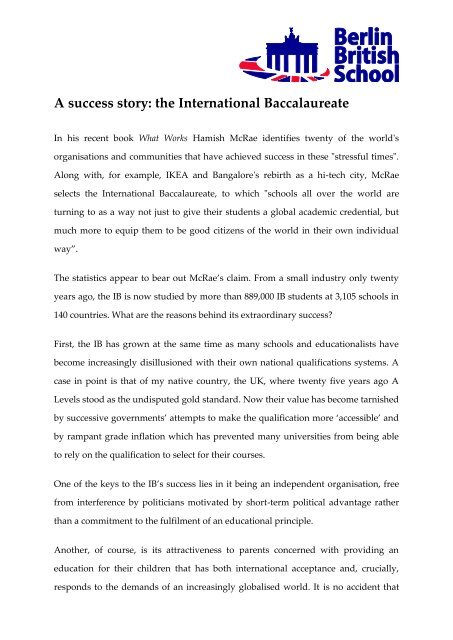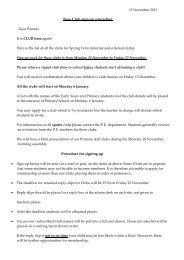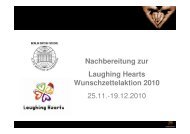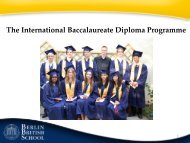A success story: the International Baccalaureate - Berlin British School
A success story: the International Baccalaureate - Berlin British School
A success story: the International Baccalaureate - Berlin British School
Create successful ePaper yourself
Turn your PDF publications into a flip-book with our unique Google optimized e-Paper software.
A <strong>success</strong> <strong>story</strong>: <strong>the</strong> <strong>International</strong> <strong>Baccalaureate</strong><br />
In his recent book What Works Hamish McRae identifies twenty of <strong>the</strong> world's<br />
organisations and communities that have achieved <strong>success</strong> in <strong>the</strong>se "stressful times".<br />
Along with, for example, IKEA and Bangalore's rebirth as a hi-tech city, McRae<br />
selects <strong>the</strong> <strong>International</strong> <strong>Baccalaureate</strong>, to which "schools all over <strong>the</strong> world are<br />
turning to as a way not just to give <strong>the</strong>ir students a global academic credential, but<br />
much more to equip <strong>the</strong>m to be good citizens of <strong>the</strong> world in <strong>the</strong>ir own individual<br />
way”.<br />
The statistics appear to bear out McRae’s claim. From a small industry only twenty<br />
years ago, <strong>the</strong> IB is now studied by more than 889,000 IB students at 3,105 schools in<br />
140 countries. What are <strong>the</strong> reasons behind its extraordinary <strong>success</strong>?<br />
First, <strong>the</strong> IB has grown at <strong>the</strong> same time as many schools and educationalists have<br />
become increasingly disillusioned with <strong>the</strong>ir own national qualifications systems. A<br />
case in point is that of my native country, <strong>the</strong> UK, where twenty five years ago A<br />
Levels stood as <strong>the</strong> undisputed gold standard. Now <strong>the</strong>ir value has become tarnished<br />
by <strong>success</strong>ive governments’ attempts to make <strong>the</strong> qualification more ‘accessible’ and<br />
by rampant grade inflation which has prevented many universities from being able<br />
to rely on <strong>the</strong> qualification to select for <strong>the</strong>ir courses.<br />
One of <strong>the</strong> keys to <strong>the</strong> IB’s <strong>success</strong> lies in it being an independent organisation, free<br />
from interference by politicians motivated by short-term political advantage ra<strong>the</strong>r<br />
than a commitment to <strong>the</strong> fulfilment of an educational principle.<br />
Ano<strong>the</strong>r, of course, is its attractiveness to parents concerned with providing an<br />
education for <strong>the</strong>ir children that has both international acceptance and, crucially,<br />
responds to <strong>the</strong> demands of an increasingly globalised world. It is no accident that
<strong>the</strong> IB’s growth has been accompanied by a rapid expansion of international schools<br />
in response to mobility of labour and globalisation of education in general. An<br />
internationally recognised - and hence transferable - qualification has thus become<br />
increasingly attractive to such schools as well as to <strong>the</strong>ir student body: <strong>the</strong> global<br />
citizens of <strong>the</strong> future.<br />
But that is only part of <strong>the</strong> explanation. The main reason for <strong>the</strong> IB's <strong>success</strong> lies of<br />
course in <strong>the</strong> quality of <strong>the</strong> product itself: chiefly recognised for being a qualification<br />
for entry to universities around <strong>the</strong> world, <strong>the</strong> IB is in fact made up of three<br />
programmes of learning spanning <strong>the</strong> 3 to 18 age range, all of which are underpinned<br />
by an educational philosophy which is as important as <strong>the</strong> content of each of <strong>the</strong><br />
three individual programmes. Its bold mission statement to develop inquiring,<br />
knowledgeable and caring young people who help to create a better and more peaceful world<br />
through intercultural understanding and respect stands in striking contrast to <strong>the</strong><br />
utilitarian values, that stifle creativity and visionary thinking, of many countries’<br />
national educational systems.<br />
The IB Diploma, <strong>the</strong> 16 - 18 programme and <strong>the</strong> jewel in <strong>the</strong> IB crown, offers a<br />
prescribed breadth of subject choices, so that to be awarded <strong>the</strong> full Diploma<br />
students have to study at least one science, a modern language and a humanity, as<br />
well as maths and <strong>the</strong>ir first language. With three subjects at Higher and three at<br />
Standard Level, Theory of Knowledge (a course in critical thinking) and an Extended<br />
Essay (of four thousand words on a subject of <strong>the</strong> student’s choice) to hold <strong>the</strong><br />
structure toge<strong>the</strong>r, <strong>the</strong> IB Diploma has a coherence and balance, as well as breadth,<br />
that educationalists and universities applaud.<br />
The Diploma also recognises, through ‘Creative, Action and Service’ (<strong>the</strong> third<br />
component, along with ToK and <strong>the</strong> Extended Essay, of <strong>the</strong> Diploma’s ‘core’) that
education should not be confined to <strong>the</strong> classroom. All Diploma students have to<br />
complete Creative work, Action (sport), and Service to <strong>the</strong> local or wider community.<br />
At <strong>Berlin</strong> <strong>British</strong> <strong>School</strong> (whose motto, a <strong>British</strong> education today for <strong>the</strong> global citizens of<br />
tomorrow, encapsulates its philosophy) we not only practise <strong>the</strong> IB's philosophy,<br />
which we hope infuses all aspects of <strong>the</strong> school’s life, but value it as a passport to <strong>the</strong><br />
world of work, as well as university. Employers are attracted to bilingual applicants<br />
who are also literate and numerate. And, as <strong>the</strong> IB continues to boom across <strong>the</strong><br />
globe, it seems that o<strong>the</strong>r countries recognise that a post-sixteen curriculum which<br />
embraces coherence, balance, breadth, rigour, compassion and a commitment to<br />
‘lifelong learning’ is vital for <strong>the</strong>ir economic prosperity, cultural development and<br />
general well-being.<br />
Many students at <strong>Berlin</strong> <strong>British</strong> <strong>School</strong> – and elsewhere – will continue to find <strong>the</strong> IB<br />
Diploma very challenging. But, if <strong>the</strong>ir <strong>success</strong> in recent years is anything to go by,<br />
<strong>the</strong>y will continue to secure places at top universities as well as be provided with a<br />
firm foundation on which to build <strong>the</strong>ir futures.<br />
Graham Lacey, formerly Deputy Head at one of <strong>the</strong> world’s leading IB Diploma schools,<br />
Sevenoaks <strong>School</strong> in <strong>the</strong> UK, has been from August 2010 Head of <strong>Berlin</strong> <strong>British</strong> <strong>School</strong> which<br />
offers a <strong>British</strong> style education in an international context to students from 3 to 18 and is<br />
situated in <strong>the</strong> Charlottenburg-Wilmersdorf area of <strong>Berlin</strong>: www.berlinbritishschool.de









